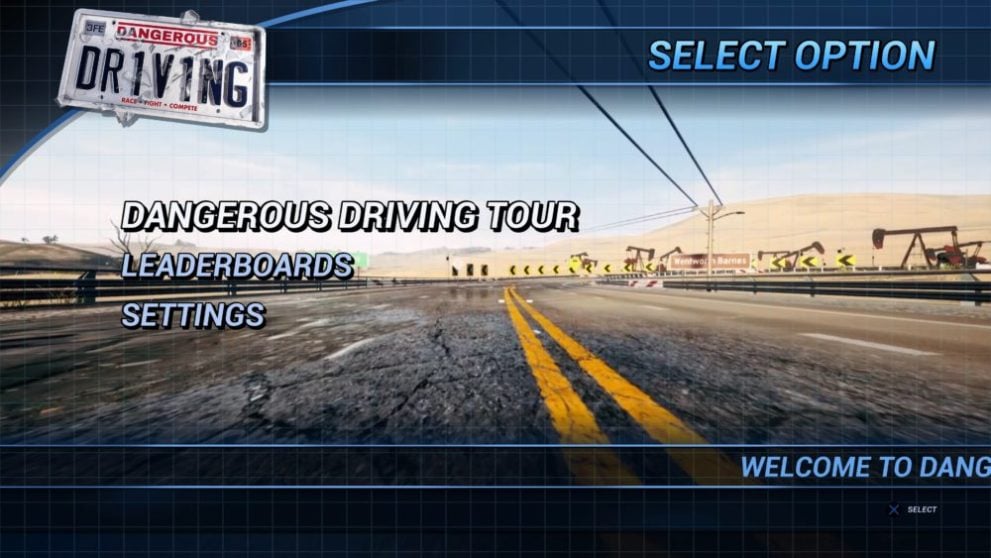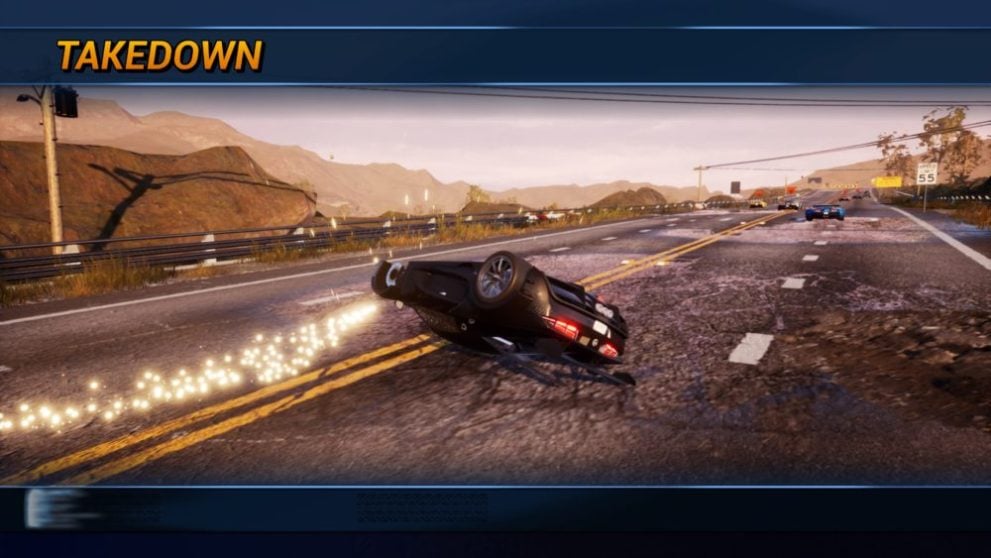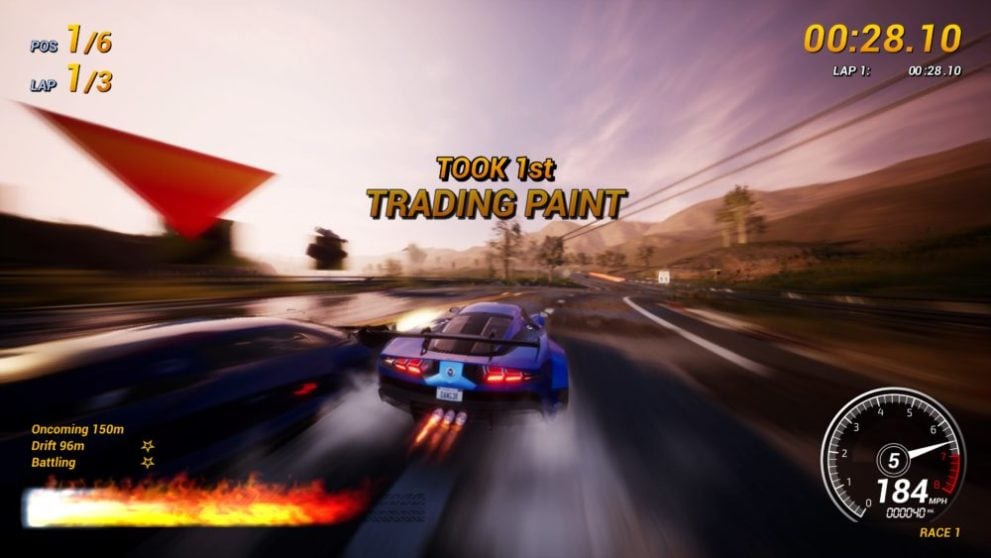Dangerous Driving on PlayStation 4
Those with fond memories of Burnout Revenge and Takedown have been clamoring for a successor for years, especially with EA showing no signs of continuing the series since Paradise’s release more than 10 years ago. Now though, Three Fields, which is a studio made up of Criterion founders, are back with Dangerous Driving.
Dangerous Driving is more than a throwback to the old Burnout games though, it’s a homage. Not only is it a fast-paced arcade racer with a focus on crashing, but it looks like the older games in everything from the crash cameras to the design of the menus.
If you loved the Burnout titles back in the PS2 and Xbox days, Dangerous Driving will certainly put a smile on your face with the nostalgia factor alone. That being said, it’s far from the triumphant return a lot of people hoped for. Yes, it’s supposed to be a throwback, but Dangerous Driving looks and feels old.

The driving itself is the game’s best feature. It’s what you’d expect: twitchy, super fluid, and very easy to control, especially once you get to grips with the sensitive drifting and the importance of boosting.
Racing along the 30 courses at full speed, taking out opponents is undeniably fun. Cars accelerate quickly, a dab of brakes sends you drifting around corners, and sparks fly constantly. The speed is breathless at times and when you’re going full pelt, it perfectly captures what made Burnout special.
There’s also a great variety in the modes. There are nine in total, running from traditional races to one called Heatwave that adds two miles per hour to your max speed for every full boost bar you use in a row. They’re also broken up well in the vehicle type tiered championships, letting you experience all the tracks and modes early on.
It all feels rather basic at times, though. Collisions are inconsistent, with you being able to slam into barriers but any small touch with traffic will cause a crash, any time you get some air the animation is a little floaty and awkward, and Pursuit events are limited to you taking a bar of health off an escaping car with any minor touch rather than attempting to take them down. There’s very little anywhere that builds significantly on the games that influence it.
Unfortunately though, there’s a lot else that gets in the way of the fun. With it being priced at $29.99, I never expected Gran Turismo with cinematic crashes when it came to visuals, but Dangerous Driving looks decidedly underwhelming.
The glare of the sun and the reflection of puddles littering the road look great, but look out beyond the barriers on each course and you’ll see dull settings with very little detail.
It’s the crash animations that are most disappointing though. Aside from sparks flying, bent doors, and the occasional disconnecting wheel, there’s not a whole lot to the damage animations.
The takedown cutscenes look old, with cars crashing into trucks and walls like a bumper car, just ricocheting around unrealistically. Rather than sweeping, Fast & Furious style cinematics, we see the car tumble from one angle before fading to black and the race continuing.
The crash animations in the likes of Need for Speed Rivals and even Burnout Paradise are more impressive and Dangerous Driving lacks the spectacle to make it the modernization of Criterion’s classic titles that we hoped it would be.

Also, while the variation in the modes is more than welcome, the AI and difficulty is frustratingly unbalanced, to the point that each mode plays out in the same way almost every time, no matter which track you’re on and which vehicle you’re using.
Road Rage events, which are probably the best Dangerous Driving has to offer, are often very easy due to how simple takedowns are, yet Shakedowns (the game’s time trial events) are often given tough time limits, with no indication of how far you are from the finish.
Elsewhere, all you have to do in Face Off events, which see you race one on one to unlock a new car, is take your opponent out early, boost away, and stroll to the finish, crashing multiple times being your only worry. I’d often find myself 30 to 40 seconds ahead after one takedown early on in an event, especially in the first few classes of the Tour.
You seem to be punished for crashing more than AI racers, with you often being six or seven seconds behind after a crash but only two or three ahead after taking an opponent out, but they often find it hard to catch up.
However, I’ve found it to be the opposite case in standard Races and Heatwave events. No matter how well you’re racing, crash once and three opponents will be right there to overtake, always seemingly the same distance behind you. It makes Race-focused events predictable.
You catch up to them from the start, take a couple out, boost into a lead. Then, crash once and you’re back to fourth, even after a lap or two of uninterrupted racing. It takes all the excitement away from being in first and getting involved in combat. Essentially, due to how the AI is in these modes, only the final few hundred yards of a race really matter.
Also, while expected in almost any racing game, traffic can feel a little heavy at time in some modes, especially those in which you’re expected to be boosting constantly. Crashing feels very luck based and it breaks up the action a little too often.
I might just be slow to react, but every time you drift around a corner, you simply have to hope that there’s no traffic trundling along on your racing line.

I’ve also had a few issues with bugs. Frame rate has been the biggest issue, with severe drops happening when entering tunnels or emerging from dramatic crashes.
Elsewhere though, I’ve fallen through the track in the middle of a race, been stuck in infinite spins after a crash, and even been bumped by traffic before a race began, disrupting the start procedure and forcing me to quit the game entirely. They’re not frequent, but to have events prematurely halted by technical issues is frustrating.
Three Fields has made a few attempts to modernize the Burnout experience with Dangerous Driving, however. The most significant addition being ‘persistent wrecks,’ which keeps crashed cars on the track until the end of the race.
It’s cool to see the evidence of a race remain, and they certainly add to the nervousness on the final lap, but at times they feel like just more obstacles to crash into and break up the action.
Dangerous Driving’s Spotify integration is also welcome, allowing you to choose the music you want to drive to. If you’re not a Premium member though, you’ll soon become very familiar with the game’s single included track.
Dangerous Driving is undeniably fun. Taking out other racers at 200mph always will be insanely enjoyable and Three Fields has taken full advantage of Burnout nostalgia. However, underwhelming crash physics, poorly balanced AI racers, and some technical problems keep their game from being the modernization of Criterion’s classic that fans hoped it would be.
Score: 3/5 – Fair
For more information on how we review games, check out Twinfinite’s review policy here.
